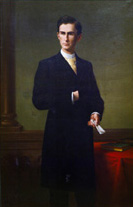WFU to host symposium on Thomas Dixon
 To examine issues of race, religion, gender and the power of popular fiction and film, Wake Forest University will hold a symposium on “Thomas Dixon Jr. and the Making of Modern America” on April 10-12.
To examine issues of race, religion, gender and the power of popular fiction and film, Wake Forest University will hold a symposium on “Thomas Dixon Jr. and the Making of Modern America” on April 10-12.
Dixon is known best as the author of “The Clansman,” the book upon which D.W. Griffith based his pioneering and controversial 1915 film “The Birth of a Nation.”
Organized by Randal Hall, associate director of merit-based scholarships, and Michele Gillespie, associate professor of history, the symposium will feature a screening of “The Birth of a Nation,” lectures by leading scholars on topics such as “Southern Reaction to ‘The Clansman’ on Stage and Screen” and “Gender and Race in Dixon’s Religious Ideology.”
“Dixon’s life demonstrates how deeply racism and conservative views of gender penetrated American culture,” Hall said. “In this symposium, we will evaluate Dixon’s dual roles as not only a creator of cultural attitudes regarding race and other issues, but also as a reflection of the biases of his time.”
Throughout a long career as an actor, lawyer, politician, minister, lecturer and writer, Dixon (1864-1946) cultivated controversy about some of the most important issues facing the South and the nation. Scholars have highlighted Dixon as a proponent of white supremacy and traditional roles for women, but have made little attempt to analyze the context and contradictions of his complex life, Hall said.
After graduating from Wake Forest in 1883, Dixon became a well-known Baptist minister who preached at the influential Twenty-Third Street Baptist Church in New York City. Later, he left the church to speak over the next four years to audiences overflowing lecture halls throughout the nation. He then turned to writing novels, beginning with “The Leopard’s Spots,” published in 1902. Selling more than 100,000 copies in its first few months, the book, along with its sequel “The Clansman” and a hit play based on the novels, established Dixon as a major interpreter of Southern history to the nation. “The Birth of a Nation,” the film based on the two novels, has been both revered as a cinematic achievement and reviled as a racist polemic that harshly stereotypes blacks and justifies the rise of the Ku Klux Klan.
“The starting point for the symposium is the falseness of Dixon’s ideas,” said Gillespie. “The facts don’t support his ideas. But, we want to understand where these ideas came from, who shared them and why they were allowed to become so powerful for so long.”
The opening panel discussion on April 10 will take place at Winston-Salem State University. A screening of “The Birth of a Nation,” will follow that evening at the North Carolina School of the Arts. All other events will be held on the Wake Forest campus.
As part of the symposium, an April 11 panel discussion on “The History and Memory of Thomas Dixon at Wake Forest” will explore Wake Forest’s relationship with its notorious alumnus.
W. Fitzhugh Brundage, William B. Umstead Professor of History at the University of North Carolina at Chapel Hill, will present “Thomas Dixon: An American Proteus” at 8 p.m. April 11. Brundage has written on lynching and on utopian socialism in the New South. His current research centers on white and black historical memory in the South since the Civil War.
Bill Leonard, dean of the Wake Forest Divinity School, will moderate a panel discussion on “Thomas Dixon and the Social Aspects of Christianity” on April 12. A session on “Literary Strategy in the Novels of Thomas Dixon” will follow.
The symposium will close with a talk titled “Do Movies Have Rights?” by Louis Menand, Pulitzer Prize-winning author for his 2002 book, “The Metaphysical Club,” and culture critic for The New Yorker. Menand is distinguished professor of English at the City University of New York. The talk will begin at 6 p.m. April 12 in Wake Forest’s Scales Fine Arts Center, Room 102.
Gillespie and Hall are teaching an undergraduate seminar on Dixon during the spring semester. Students from the class will present papers during the symposium.
“In the class, students are finding out how troubling ideas can be conveyed in an appealing way through popular fiction and film,” Gillespie said. “Hopefully, that knowledge will make them more critical in looking at their world.”
Gillespie is the co-editor of the recently published book “Neither Lady Nor Slave: Working Women of the Old South.” She is currently writing a biography of Katherine Reynolds, wife of tobacco magnate Richard Joshua Reynolds.
Hall is the author of the 2000 book “William Louis Poteat: A Leader of the Progressive Era South.” A part-time assistant professor of history at Wake Forest, he also co-edited “The Southern Albatross: Race and Ethnicity in the American South” in 1999. Hall and Gillespie co-founded the Southern Historians of the Piedmont, a working group for historians of the South.
For a complete schedule of events, visit the symposium Web site at www.wfu.edu/Academic-departments/History/Events/Dixon/
Individual symposium events are free and open to the public. Registration for the entire conference, including meals, is $10. The deadline for registration is April 5. For more information or to register, contact Michele Gillespie at 336-758-4270 or Randal Hall at 336-758-4927.
Categories: Arts & Culture, Community Impact, Happening at Wake
Media Contact
Cheryl Walker
media@wfu.edu
336.758.5237



